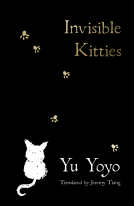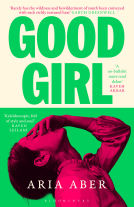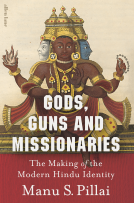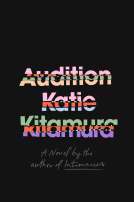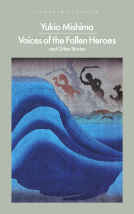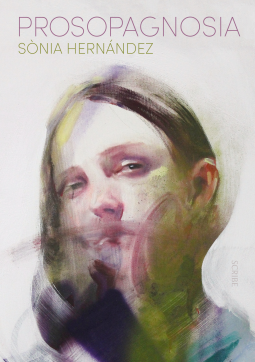
Prosopagnosia
by Sònia Hernández, (trans. Samuel Rutter)
This title was previously available on NetGalley and is now archived.
Send NetGalley books directly to your Kindle or Kindle app
1
To read on a Kindle or Kindle app, please add kindle@netgalley.com as an approved email address to receive files in your Amazon account. Click here for step-by-step instructions.
2
Also find your Kindle email address within your Amazon account, and enter it here.
Pub Date 10 Feb 2022 | Archive Date 11 Jan 2022
Talking about this book? Use #Prosopagnosia #NetGalley. More hashtag tips!
Description
A sly and playful novel about the many faces we all have.
Fifteen-year-old Berta says that beautiful things aren’t made for her, she isn’t destined to have them, the only things she deserves are ugly. It’s why her main activity, when she’s not at school, is playing the ‘prosopagnosia game’ — standing in front of the mirror and holding her breath until she can no longer recognise her own face.
Berta’s mother is in her forties. By her own estimation, she is at least twenty kilos overweight, and her husband has just left her. Her whole life, she has felt a keen sense of being very near to the end of things. She used to be a cultural critic for a regional newspaper. Now she feels it is her responsibility to make her and her daughter’s lives as happy as possible.
A man who claims to be the famous Mexican artist Vicente Rojo becomes entangled in their lives when he sees Berta faint at school and offers her the gift of a painting. This sets in motion an uncanny game of assumed and ignored identities, where the limits of what one wants and what one can achieve become blurred.
Advance Praise
‘With [Prosopagnosia], Sònia Hernández cements her place as one of the most individual voices of her generation.’ – La Vanguardia
‘In this warm, lively, and intellectual novel, Hernández’s greatest achievement is allowing the protagonist to release her trauma in a way that is both simple and true.’ – Santos Sanz Villanueva , El Cultural
‘One of the best writers of her generation.’ – Inés Martín Rodrigo , ABC
‘A novel of our times that explores the difficulty of constructing oneself as a person and the chaos of how things seem to happen to us.’ – Lluís Satorras , Babelia
‘A tale of the conflict between reality and deception, and how the many forms of exile and solitude come together. A beautiful, enigmatic novel.’ – Enrique Vila-Matas , El País
Available Editions
| EDITION | Paperback |
| ISBN | 9781912854776 |
| PRICE | £12.99 (GBP) |
Links
Featured Reviews
 Reviewer 876149
Reviewer 876149
In 2010 Granta included Sònia Hernández on their list of the best, young Spanish novelists but this is the first novel available in English – although at 85 pages it’s really a novella. This is one of those rare occasions where I ended up really liking a book despite actively disliking a lot of its features. Not only that, I quickly realised I’d approached this with a completely false set of expectations. I think part of that stemmed from the English-language title, lifted from the first of two sections. The Spanish title’s from part two and, I think, sets up an entirely different relationship between story and reader, adding a much-needed, element of dramatic irony, a level of suspense and scepticism that alters how the first half works. Prosopagnosia’s discussed but more as metaphor, tied to wider themes around perception/self-perception.
There are three main characters, a mother, daughter Berta and an older man Vicente Roja. Neither Berta or her mother are at ease with themselves or their surroundings, unmoored after the sudden departure of Pablo, Berta’s father. When a psychology class introduces the notion that reality’s shaped by learnt responses ordering how and what we see, Berta and her friends are so fascinated they invent the prosopagnosia game, desperate to see themselves in some radically different form. The mother becomes equally fascinated by meeting Vicente Roja, who seems to her a sage-like, “moral beacon,” holding the key to the truths she’s seeking. Initially I found the slightly stereotypical nature of Hernández’s characters frustrating, too literal, lacking nuance, but then I realised this piece only gestures towards psychological realism. It’s essentially a novel of ideas, in which the mannered prose, thinly-sketched characters and slender plot, are vehicles for Hernández’s exploration of the role of art and the artist, authenticity, identity, and the performance of the self.
It’s a highly referential piece, drawing on Hernández’s background as an art and literary critic and her interests in writers like Max Aub and Fernando Pessoa, as well as artists and critics, like Juan Garcia Ponce, and notably, Mexican artist Vicente Roja. Hernández ventures into debates that may be familiar from ongoing discussions surrounding literary and artistic hoaxes - which feature heavily here, from Poe to Pessoa. She’s interested in questions around authority, authorship, and identity, whether who speaks is more, or less, significant than what’s spoken; and the persona we may or may not adopt to negotiate the world. She teases out issues around fabrication as a creative act, rather than a negative - not so much about lying as a process of construction. She poses a series of complex, tantalising questions, although they’re also controversial ones in the light of recent anxieties around the Internet and fake news. It’s an uneven book, with some awkward, clumsy aspects but I frequently found it stimulating, thoughtful, and, above all, I liked its ambition. Translated here by Samuel Rutter.
Many thanks to Netgalley UK and publisher Scribe Publications for an arc
This is a tantalising book that shape-shifts playfully as it seems to start off as one type of story before metamorphosing into something unexpected and different. In fluent and accessible prose, Hernández (ably translated by Samuel Rutter) deals with big abstract, philosophical topics - the difference between truth and reality, authenticity in art and authority, subjectivity versus a 'reality' which is communally constructed and socially authorised, female self-abnegation versus empowerment - wrapped up in a story that, at first, seems to follow an art/fraud narrative before swerving into something far more challenging and unexpected. Along the way it isn't afraid to blend humour with more sombre elements so that the smart intellectual sharpness co-exists with a droll wittiness that won me over. Definitely a writer to watch.
It can feel quite hard to pin down this novella- as it flits between a mother and her daughter, our grip on reality blurs just as much as it does for the characters themselves. Characters appear and are not who they say they are, but just like the title (the inability to recognise faces, even familiar ones) the book shifts constantly and keeps you at an arm's length.
Whereas I can see how for many people that can be alienating and unenjoyable, I think it lent a kind of disquieting power to the book. It almost does not matter who is who and what is happening- the book instead feels like a surreal short film.
And just like many books from the brilliant publisher Scribe, this book is a shapeshifter that is not ever just one thing.
I received an advanced copy of this book from NetGalley and Scribe in exchange for an honest review.





